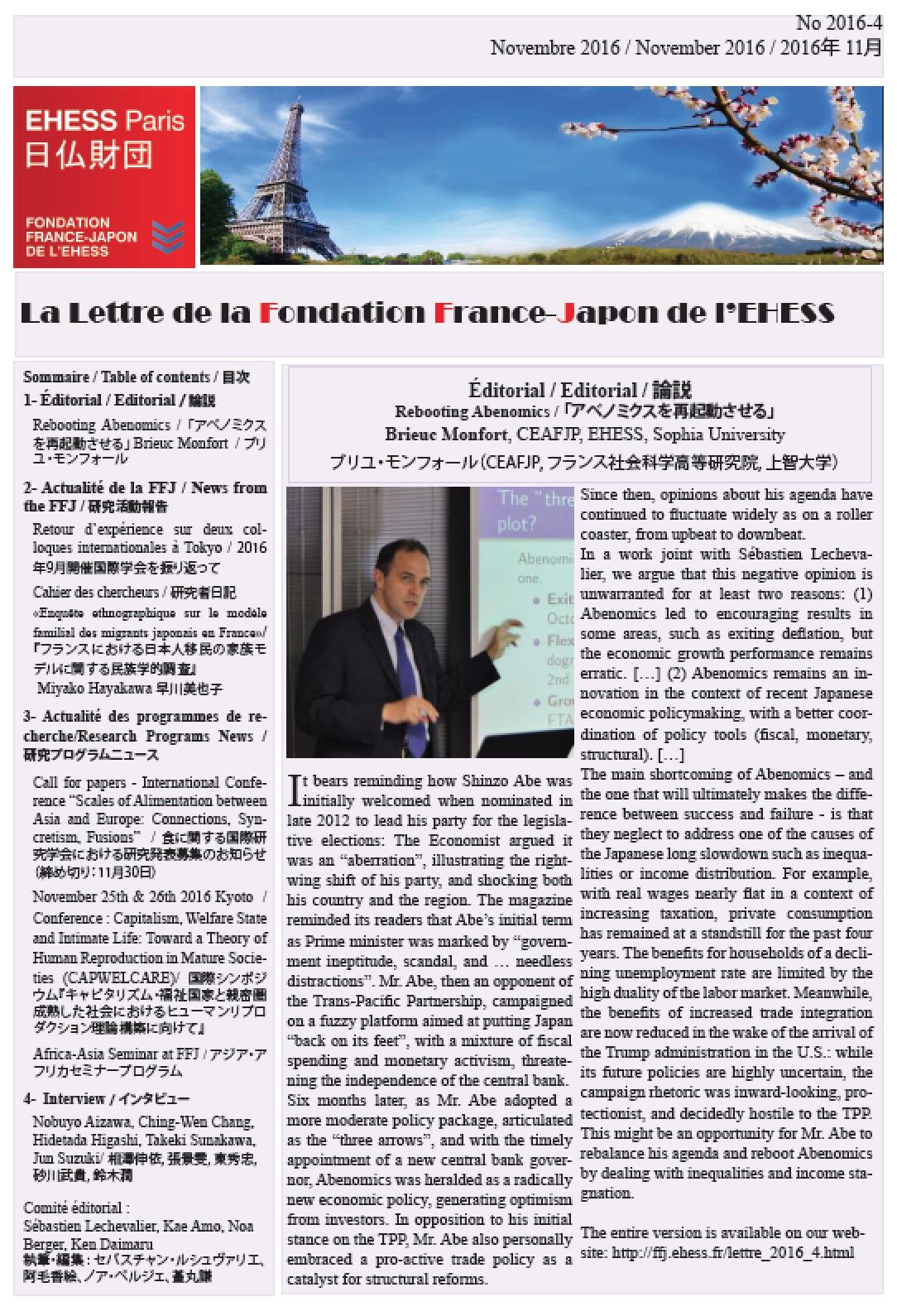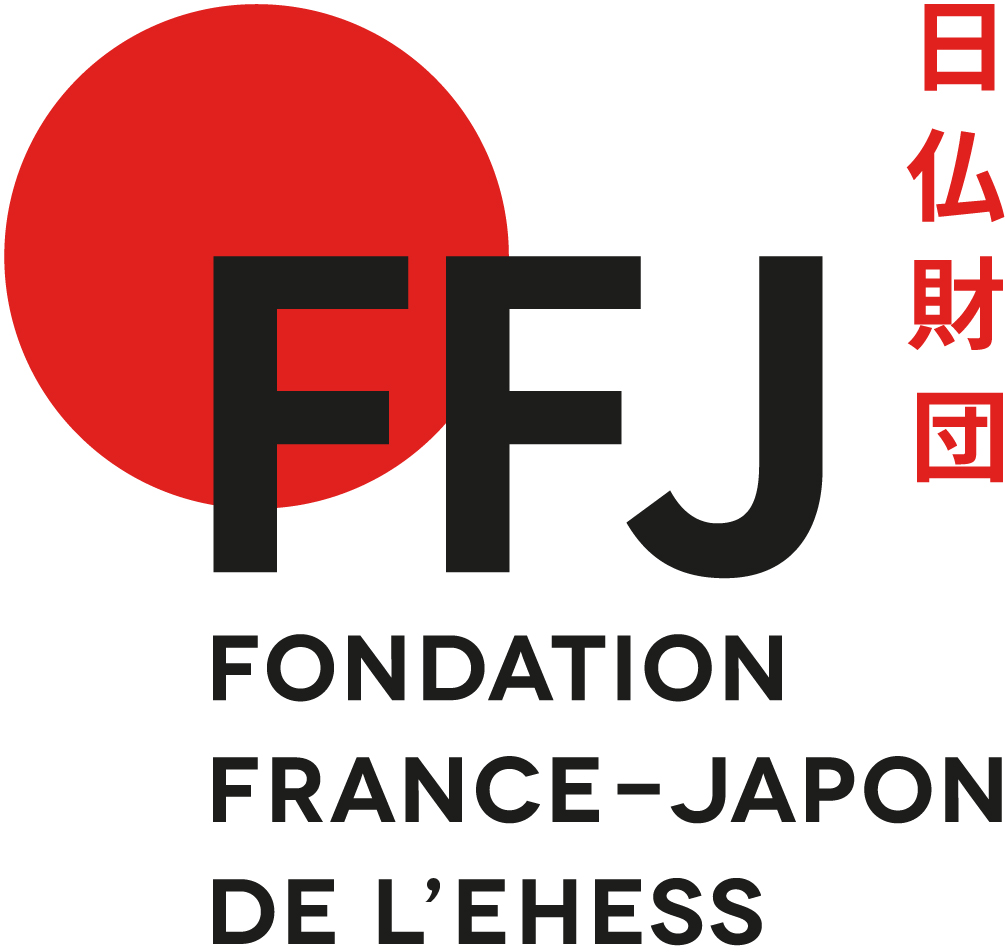La Lettre de la Fondation France-Japon de l'EHESS
No 2016-04
Novembre 2016
 |
1- Éditorial
Rebooting Abenomics
Brieuc Monfort, CEAFJP, EHESS, Sophia University, Tokyo
It bears reminding how Shinzo Abe was initially welcomed when nominated in late 2012 to lead his party for the legislative elections: The Economist argued it was an “aberration”, illustrating the shift to the right of his party, and shocking both his country and the region. The magazine reminded its readers that Abe’s initial term as Prime minister was marked by “government ineptitude, scandal, and … needless distractions”. Mr. Abe, then an opponent of the Trans-Pacific Partnership, campaigned on a fuzzy platform aimed at putting Japan “back on its feet”, with a mixture of infrastructure spending and monetary activism, threatening the independence of the central bank.
Six months later, as Mr. Abe adopted a more moderate policy package, articulated as the “three arrows”, and with the timely appointment of a new central bank governor, Abenomics was heralded as a radically new economic policy, generating optimism from investors. In opposition to his initial stance on the TPP, Mr. Abe also personally embraced a pro-active trade policy as a catalyst for structural reforms. Since then, opinions about his agenda have continued to fluctuate widely as on a roller coaster, from upbeat to downbeat. Most recently, Abenomics are often derided as yet another failed economic experiment.
In a work joint with Sébastien Lechevalier, we argue that this negative opinion is unwarranted for at least two reasons:
(1) Abenomics led to encouraging results in some areas, such as exiting deflation, but the economic growth performance remains erratic. Core inflation excluding energy has been consistently in positive territory for the past four years (at 0.3% on average, against –0.6% during the previous ten years), despite a recent return of negative headline inflation and a downward inflation trend. Annualized GDP growth has been slightly higher during Abenomics than over the previous ten years (at 0.9% against 0.8%) and has accelerated to 1.6% for the first three quarters of 2016. While decent, these results remain well short of the initial expectations of early 2013 of reaching an inflation target of 2% and the optimistic 2% rate of GDP growth. In addition, the doomsday scenario of “Abegeddon” – an inflationary spiral with rising long interest rates leading to a combination of sovereign, banking, and external crises – did not materialize.
(2) Abenomics remains an innovation in the context of recent Japanese economic policymaking, with a better coordination of policy tools (fiscal, monetary, structural). Its major novelty consisted not just in monetary policy – in sharp contrast with the overly cautious policy of the previous decade - but also in greater overall policy consistency and a clearer prioritization of goals.
Mr. Abe also acted much more aggressively compared to his predecessors in some areas of structural reforms such as trade policy. With hindsight, one may regret that other much-needed reforms remain either rhetorical or piecemeal (e.g. empowerment of women or immigration…)
The main shortcoming of Abenomics – and the one that will ultimately makes the difference between success and failure - is that they neglect to address one of the causes of the Japanese long slowdown such as inequalities or income distribution. For example, with real wages nearly flat in a context of increasing taxation, private consumption has remained at a standstill for the past four years. The benefits for households of a declining unemployment rate are limited by the high duality of the labor market.
Meanwhile, the benefits of increased trade integration are now reduced in the wake of the victory of Mr. Trump in the U.S. presidential elections : while his future policies are highly uncertain, not least because of the division of his own party or his ability to implement pro-cyclical policies, he has already confirmed his intention to withdraw from the TPP, in line with a campaign rhetoric decidedly inward-looking and protectionist . This might be an opportunity for Mr. Abe to rebalance his agenda and reboot Abenomics by dealing with inequalities and income stagnation.
References
· The Economist, “Japanese politics: Aberration”, Sept. 29th 2012: www.economist.com/node/21563728
· Sébastien Lechevalier et Brieuc Monfort, Leçons de l'expérience japonaise : vers une autre politique économique ?, Collection du CEPREMAP n° 41, Editions ENS rue d’Ulm, 2016 : www.presses.ens.fr/456-cepremap-lecons-de-l-experience-japonaise.html
· For an English summary of the book: ffj.ehess.fr/index/article/326/how-relevant-is-japan-s-economic-experience-to-advanced-economies.html
· For additional discussion of the politics behind Abenomics, Sébastien Lechevalier, "Ce surprenant Shinzo Abe", Le Monde, May 5th, 2014 : www.lemonde.fr/idees/article/2014/05/05/ce-surprenant-shinzo-abe_4411765_3232.html
Brieuc Monfort, CEAFJP, EHESS, Sophia University, Tokyo
It bears reminding how Shinzo Abe was initially welcomed when nominated in late 2012 to lead his party for the legislative elections: The Economist argued it was an “aberration”, illustrating the shift to the right of his party, and shocking both his country and the region. The magazine reminded its readers that Abe’s initial term as Prime minister was marked by “government ineptitude, scandal, and … needless distractions”. Mr. Abe, then an opponent of the Trans-Pacific Partnership, campaigned on a fuzzy platform aimed at putting Japan “back on its feet”, with a mixture of infrastructure spending and monetary activism, threatening the independence of the central bank.
Six months later, as Mr. Abe adopted a more moderate policy package, articulated as the “three arrows”, and with the timely appointment of a new central bank governor, Abenomics was heralded as a radically new economic policy, generating optimism from investors. In opposition to his initial stance on the TPP, Mr. Abe also personally embraced a pro-active trade policy as a catalyst for structural reforms. Since then, opinions about his agenda have continued to fluctuate widely as on a roller coaster, from upbeat to downbeat. Most recently, Abenomics are often derided as yet another failed economic experiment.
In a work joint with Sébastien Lechevalier, we argue that this negative opinion is unwarranted for at least two reasons:
(1) Abenomics led to encouraging results in some areas, such as exiting deflation, but the economic growth performance remains erratic. Core inflation excluding energy has been consistently in positive territory for the past four years (at 0.3% on average, against –0.6% during the previous ten years), despite a recent return of negative headline inflation and a downward inflation trend. Annualized GDP growth has been slightly higher during Abenomics than over the previous ten years (at 0.9% against 0.8%) and has accelerated to 1.6% for the first three quarters of 2016. While decent, these results remain well short of the initial expectations of early 2013 of reaching an inflation target of 2% and the optimistic 2% rate of GDP growth. In addition, the doomsday scenario of “Abegeddon” – an inflationary spiral with rising long interest rates leading to a combination of sovereign, banking, and external crises – did not materialize.
(2) Abenomics remains an innovation in the context of recent Japanese economic policymaking, with a better coordination of policy tools (fiscal, monetary, structural). Its major novelty consisted not just in monetary policy – in sharp contrast with the overly cautious policy of the previous decade - but also in greater overall policy consistency and a clearer prioritization of goals.
Mr. Abe also acted much more aggressively compared to his predecessors in some areas of structural reforms such as trade policy. With hindsight, one may regret that other much-needed reforms remain either rhetorical or piecemeal (e.g. empowerment of women or immigration…)
The main shortcoming of Abenomics – and the one that will ultimately makes the difference between success and failure - is that they neglect to address one of the causes of the Japanese long slowdown such as inequalities or income distribution. For example, with real wages nearly flat in a context of increasing taxation, private consumption has remained at a standstill for the past four years. The benefits for households of a declining unemployment rate are limited by the high duality of the labor market.
Meanwhile, the benefits of increased trade integration are now reduced in the wake of the victory of Mr. Trump in the U.S. presidential elections : while his future policies are highly uncertain, not least because of the division of his own party or his ability to implement pro-cyclical policies, he has already confirmed his intention to withdraw from the TPP, in line with a campaign rhetoric decidedly inward-looking and protectionist . This might be an opportunity for Mr. Abe to rebalance his agenda and reboot Abenomics by dealing with inequalities and income stagnation.
References
· The Economist, “Japanese politics: Aberration”, Sept. 29th 2012: www.economist.com/node/21563728
· Sébastien Lechevalier et Brieuc Monfort, Leçons de l'expérience japonaise : vers une autre politique économique ?, Collection du CEPREMAP n° 41, Editions ENS rue d’Ulm, 2016 : www.presses.ens.fr/456-cepremap-lecons-de-l-experience-japonaise.html
· For an English summary of the book: ffj.ehess.fr/index/article/326/how-relevant-is-japan-s-economic-experience-to-advanced-economies.html
· For additional discussion of the politics behind Abenomics, Sébastien Lechevalier, "Ce surprenant Shinzo Abe", Le Monde, May 5th, 2014 : www.lemonde.fr/idees/article/2014/05/05/ce-surprenant-shinzo-abe_4411765_3232.html
September 12th, 2016 Tokyo
Joint International Conference CNRS-EHESS/FFJ-JST/RISTEX “Innovation Beyond Technic”
September 15-17, 2016, Tokyo
Understanding institutional change in Asia: A comparative perspective with Europe
JSPS Core-to-Core Program workshop/ INCAS-2nd workshop at Waseda University
Cahier des chercheurs
Enquête ethnographique sur le modèle familial des migrants japonais en France
Miyako Hayakawa
3- Actualité des programmes de recherche
Call for papers - International Conference “Scales of Alimentation between Asia and Europe:
Connections, Syncretism, Fusions” (Deadline for submission: November 30, 2016)
Connections, Syncretism, Fusions” (Deadline for submission: November 30, 2016)
November 25th & 26th 2016 Kyoto
Conference : Capitalism, Welfare State and Intimate Life: Toward a Theory of Human Reproduction
in Mature Societies (CAPWELCARE)
Conference : Capitalism, Welfare State and Intimate Life: Toward a Theory of Human Reproduction
in Mature Societies (CAPWELCARE)
Seminar program : Understanding the relations between Africa & Asia:
Transversal space of research and education (CRAA-ETRE)
4- Presentation of new visiting researchers at CEAFJP from fall 2016
Nobuyo Aizawa (Tokyo Keizai University), Ching-Wen Chang (The University of Tokyo), Hidetada Higashi (Yamanashi Gakuin University), Takeki Sunakawa (Kobe University), Jun Suzuki (GRIPS)






